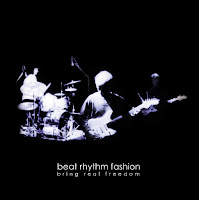As I read through the Failsafe Records promo blurb for the Auckland-based Haiku Redo’s debut album Disco Summer, I’m reminded of the ancient proverb “mighty oaks from little acorns grow”.
The little acorns, in this instance, are a bunch of demo recordings from the late 90s, made by drummer and songsmith Craig Horne and his bass playing partner, Barbara Morgan. The mighty oak, if you will (hey, just go with it), is Disco Summer itself.
The demos were recorded during a period when both Horne and Morgan were preoccupied elsewhere, working alongside Kiwi pop chameleon Andrew Fagan (The Mockers), as members of the band Lig. The shelved demos never really went anywhere, but they did catch the ear of Failsafe Records guru Rob Mayes, and roughly a quarter of a century later, they were the remote catalyst for a brand-new album release.
The timeline isn’t totally clear for me, but at some stage in the Haiku Redo backstory there was a suggestion that those demos be tidied or spruced up for wider consumption and a release on Failsafe. Horne decided he wanted to do a little bit more than that, and he wound up writing a whole bunch of new tunes. Those new tunes, plus one solitary original demo, became Disco Summer.
Joined by another former Lig associate, guitarist Kevin Moody, plus fellow guitarist Dianne Swann (The BADS, Julie Dolphin, many others), Horne and Morgan formed Haiku Redo, and the band released a series of catchy digital singles across 2024 ahead of Disco Summer’s more recent release.
All of the advance singles feature on the album itself, with the best of those for me being ‘Thinking of You’ which opens Disco Summer and almost works as a statement of intent – it is tight, melodic, and full of exactly the sort of guitar-led goodness most of us readily associate with Failsafe and indie rock in general.
Horne writes well. For the most part these songs are clever and well-crafted low key indie pop gems, with hooks aplenty, and there’s a deceptively strong element of humour threaded into the lyrics of many of the twelve tracks on offer (‘My Sisters Name’, ‘Fleetwood Mac Cover’).
The band can do slow and light (the title track, plus ‘It’s Just Too Long’) or they can do fast and heavy (‘Radio 1’, ‘Change is the Only Certainty’), but the overriding sense I get listening to Disco Summer is that this is a group of musicians who know what they’re about and what they want to achieve. A sense that they’ve played together a lot and enjoy that experience. I guess, also, their past connection from as far back as two decades ago would tend to support that notion. It all feels quite effortless.
The final track ‘Fleetwood Mac Cover’ might feel like a belated add-on at first, an irreverent lightweight novelty track perhaps, but it becomes quite a charmer when afforded the familiarity of a couple of listens. It isn’t, naturally, a Fleetwood Mac cover, rather it scoffs at the idea of performing one, and it’s a pretty cool way to close out the album.
You can pick up a copy of Disco Summer
at Haiku Redo’s Bandcamp page (here).






